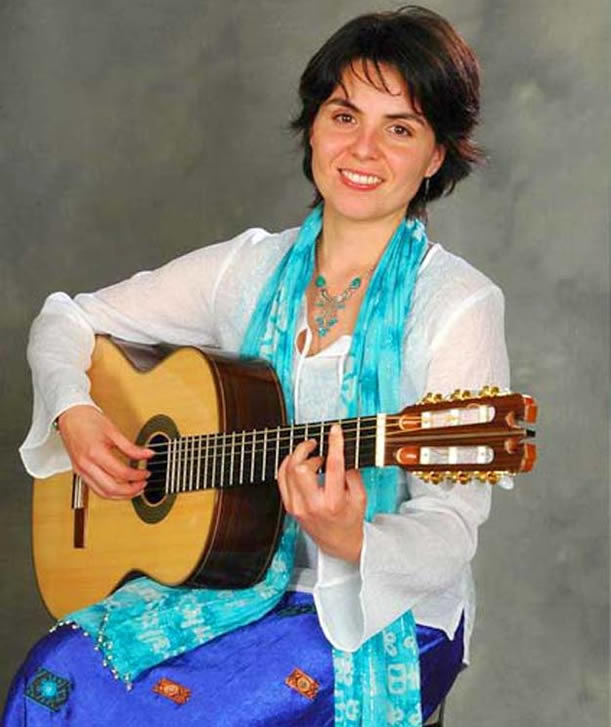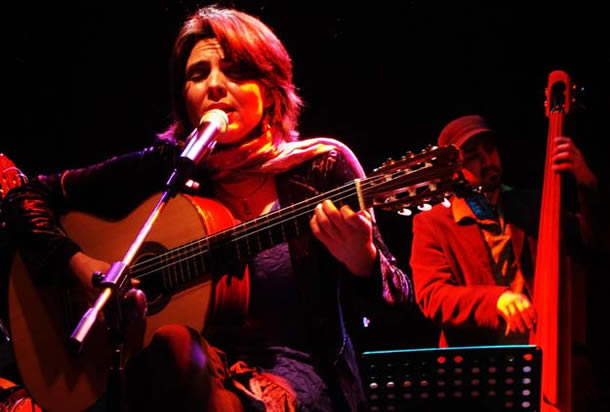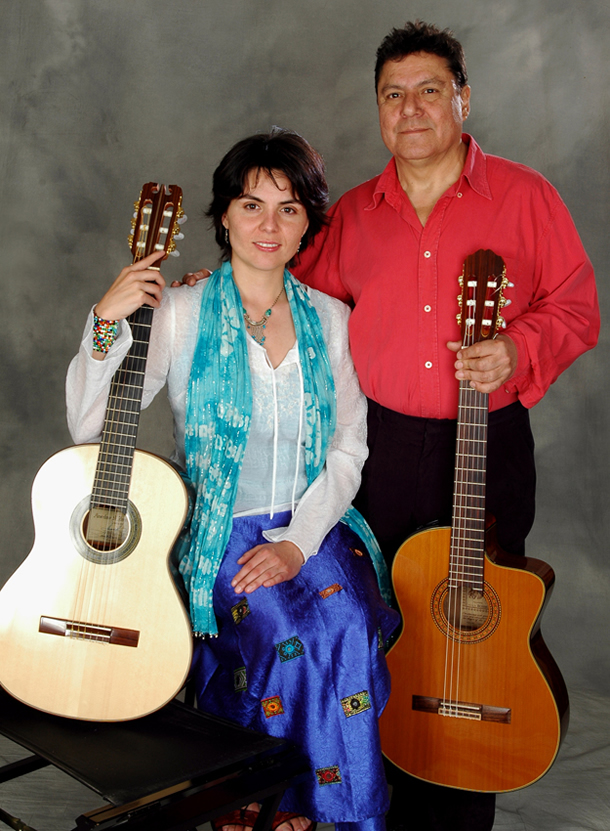en español
Elizabeth Morris


There is a woman who stands out among the diverse songwriters and singers who have been at the forefront of Latin American music made in Chile. In her multiple roles as an instrumentalist, composer, producer, and soloist, Elizabeth Morris has dedicated herself to the folkloric roots of Chile and the Americas and has consolidated a place for herself as a leader force in this genre with her records Hacia otro mar (2002), Nazca (2008) and Pájaros (2012), on top of winning the folkloric competition at the Viña del Mar Festival in 2006 with her “Canción de agua y viento” and providing songs to Pedro Aznar, Eva Ayllón, Francesca Ancarola, Pedro Villagra, Laura Fuentes, Carmen Prieto, José Seves, Magdalena Matthey, or Clarita Parra, as well as other of her peers.
Early musical career
Elizabeth Morris Keller was born in Valparaíso in 1972 and spent a good part of her childhood with her family in the German Democratic Republic, from whence she returned to Chile in 1982 at age ten. At the age of 17 she learned to play guitar and then majored in art with a specialization in sound engineering (1990) at the University of Chile and then composition and arranging at the Escuela de Artes de la Música Popular de la Sociedad Chilena de Derecho del Autor (1995), where she coincided with the musicians Alexis Venegas and Magdalena Matthey, among other classmates of her generation.
By 1997 she was performing live with the likes of Antonio Restucci, Juan Antonio Sánchez and Francesca Ancarola. Early on she played with the Chiloe-rooted band Chilhué, in the batucada [a style of Brazilian music] band Os da Quinta, in the Latin American fusion group Fa-Fandango, and between 1998 and 2000 was part of Alheña, an embryonic trio of the “new Latin American sound”, composed of Magdalena Matthey, Laura Fuentes, and Elizabeth Morris. In 1999 and 2000 she was also a guitarist in Pedro Villagra’s group; in 2000 she played in the First International “Among the Strings” Guitar Festival organized by Alberto Cumplido, and in July 2002 traveled with Ancarola to Toronto, Canada as a part of the Chilean delegation to the Seventeenth World Youth Jamboree organized by Pope John Paul II.
Elizabeth Morris plays guitar, charango [10-string Andean mandolin], tiple [12 string Colombian guitar], Venezuelan cuatro [4-string guitar], Puerto Rican cuatro [guitar with 4 pairs of strings], zampoña [Andean pan pipes], Peruvian cajón [percussion box], and other percussion instruments, and has played these instruments as a guest musician on numerous records, including Que el canto tiene sentido (1996) by Francesca Ancarola; Pagano (1998) and Quiebracanto (2000) by Pedro Villagra; Salvo tú y yo (1999) by Santiago del Nuevo Extremo; Conosci Victor Jara? (2000), recorded in Italy by the singers José Seves, Daniele Sepe, and Auli Kokko; Cancionero nocturno (2002) by Carmen Prieto, and Mañana será otro día (2004) by Magdalena Matthey. She began her lasting collaboration with José Seves during his break from Inti-Illimani with the recording of his CD Canto remolino and the two formed a duo in 2004 that also collaborated with the “Histórico” version of Inti-Illimani led by Horacio Salinas.
At the same time, Elizabeth has dedicated herself to the vocation of songwriting. The records Pasaje de ida y vuelta (2000) by Francesca Ancarola, and Delicadeza (2000) by Laura Fuentes both feature songs by Elizabeth Morris, the Peruvian marinera-style “Darte luz” and the delicate “Décimas” that seems illuminated by Violeta Parra, while at the same time her bolero “Desolación” is featured on Carmen Prieto’s (2000) record Deseos y encantos. Then on Ancarola’s (2002) record Jardines humanos, both authors co-wrote the song “Espantamales” and two years later the composer and instrumentalist debuted her third facet, as a musical producer, with the folklorist Clarita Parra’s (2004) disc Tiempo de cantar.
Songs of water and wind
Two other songs of hers, the instrumentals “Caipira” and “Landó” appeared on a compilation disc Música de este lado del sur (1996), but it was not until May 2001 that Elizabeth Morris first performed on her own, beginning her solo career with the disc Hacia otro mar (2002). In this first project, filled with rhythms inspired by the landó, cueca, marinera, raíz brasileña, and décimas she recorded some of her creative work from the beginning of her career and added songs that had become standards in her repertoire, such as “Darte luz” and “Décimas”.
In February 2006 Morris won the prize for the folkloric category of the Viña Festival with her “Canción de agua y viento”. Two years later she included the song in her second record, Nazca (2008), which she had been working on since mid-2005. In addition to demonstrating her mastery of acoustic instruments and the roots of the hayno, candombe, milonga, and tonada, among other rhythms, on this record she adds the tones of violins and cellos and includes songs such as “La barca emplumada” with its pericona rhythm, the instrumentals “Al galope” and “Itzá”, based on the novel La mujer habitada, by the Nicaraguan writer Gioconda Belli.
Morris has gone on to perform live with the Argentine musicians Beatriz Pichi Malen, Pedro Aznar and Víctor Heredia (2012) and her songs “Décimas” and “Darte luz” were recorded, respectively, by Pedro Aznar in his álbum Quebrado (2008) and por the Peruvian Singer Eva Ayllón on the álbum Eva Ayllón + Inti-Illimani Histórico (2012). She has also added work on film to her activities, with the sound track of El edificio de los chilenos (2010), a documentary by Macarena Aguiló and Susana Foxley about the children of leftist militants in Chile during the dictatorship, and with the foreground images of her hands playing the guitar in the performance of the song “El gavilán” by Violeta Parra, for Andrés Wood’s feature film Violeta se fue a los cielos (2011).
Based on this last project, since 2011 Elizabeth has been part of the shows El cantar de Violeta and Violetando, as a trio and duo along with Magdalena Matthey and the actress and singer Francisca Gavilán, star of Wood’s film. And the following year she released her third album, Pájaros (2012), featuring a new repertoire based on the Latin American rhythms of cueca, cumbia, huayno, and festejo, among others. The single “Toca y retumba”, the cumbia “Agua para chocolate”, the “Cueca del tiempo”, winner of the second-place prize in the Luis Advis Composition Contest in 2012, or the traditional Venezuelan song “Pajarillo” are all on this disc, which also includes a version of “Con toda palabra,” a tune by the U.S. singer Lhasa de Sela.
References to the sources of the Nueva Canción Chilena are still present in Elizabeth’s work, with re-elaborations of songs such as Violeta Parra’s cueca “Adiós que se va Segundo” and Víctor Jara’s song “Angelita Huenumán”, that she recorded on her second and third albums, respectively. Whether sung or played as instrumentals, her compositions are written for a variety of Latin American stringed instruments, including guitar, charango, cuatro, and tiple, and take one on a journey through sambas, décimas, boleros, and Afro-Peruvian music, among many other influences. Elizabeth Morris has taken her time but put it to good use. She has come to enrich the Nueva Canción Chilena, by opening it up to the rest of Latin America and giving it a new voice, soft and calm in song, rigorous and inventive in music.
By David Ponce. Translated from Música popular chilena: La enciclopedia de la música chilena en Internet.
Learn more about Elizabeth Morris and her music.

Elizabeth Morris with José Seves









